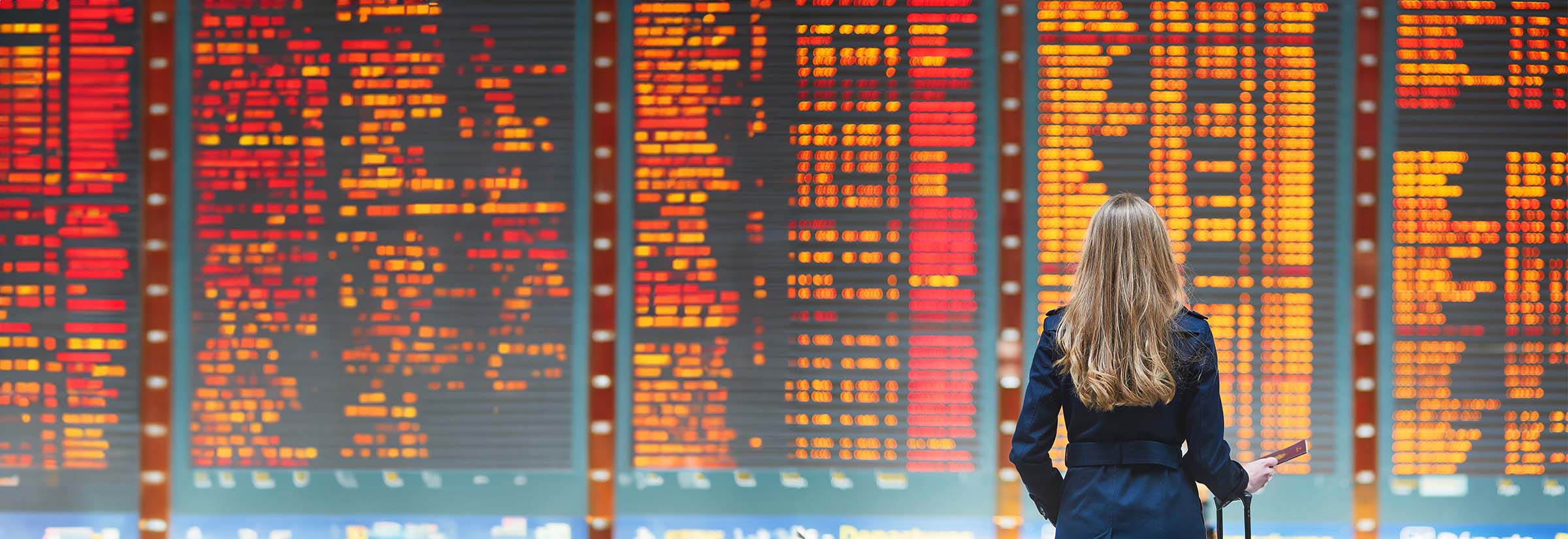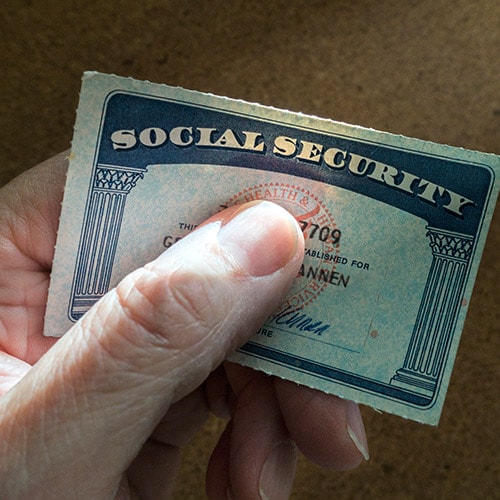It’s possible that you might spend part of your holiday snowed in at an airport. The internet can be a big help when dealing with delays, but be smart about the online risks that come with the busy travel season.
If you’re anything like me, you look at holiday travel with a mild tinge of dread. You probably already know that Thanksgiving and Christmas mark the busiest travel days of the year. But, did you know that weather accounts for over 75% of flight delays, and statistically speaking, winter storm numbers are increasing each decade?
Skip the math: that means the strong potential of bad weather and extended delays, leading to airline lounges scattered across the nation becoming overfilled with travelers waiting for their flights. Some of us are going to get caught up in it.
But it will be ok.
For, at the airport, we have the internet on our side! We can dial up a TV show for ourselves or our children. We can connect with family, friends, and colleagues to let them know where we are (and that we’re safe). We can catch up on that podcast or the eBook or perhaps even get ahead on work.
But doing these things in a crowded airport presents opportunities for bad people.
It’s a good idea to mentally prepare yourself for crowds and delays. It’s an even better idea to keep a few mental notes about how to better protect your data, information, and identity while you’re in a busy airport.
Airport Delay Tip #1 – Use a VPN
The number one piece of advice any list can give when connecting to wifi at a busy airport, or anywhere else, is that you need to use a VPN. Using a VPN hides what you’re doing online from any prying eyes of potential fraudsters on the same open network.
Or think of it this way: In a busy airport lounge, would you stand up and shout your flight numbers, your plans for the next week, what you’re bringing to the party, your home address, your email, and your cell phone number in English?
Or, given the security option, would you do so in a language that only you and the person you’re talking to speak? That’s the privacy that VPN provides.
You can easily put a VPN on any laptop, tablet, or smartphone, helping protect you against anyone on an open network that could be eavesdropping on your internet activity.
Airport Delay Tip #2 – Don’t share your screen
Sitting in a chair, sitting on the floor with your back to the windows, sitting against the wall next to the only available electrical charger, or sitting anywhere else: don’t share your screen.
When you’re checking your email, your flight itinerary, your bank balances, or shopping online, don’t give a scammer the opportunity to glance at more information than they should have. Looking over your shoulder—or even checking the reflection in the window behind you—it’s easy enough for a stranger to notice you have a hefty balance in your bank account, take note of your email address, or gather other personal information.
Always ask yourself if you’re in a place where others can shoulder-surf on your device. Make sure you lock your screen by pressing Windows+L (Windows) or Control+Command+Q (Mac) if you set your laptop or tablet down
Airport Delay Tip #3 – Hide your bag tag
It’s a common situation in a flight delay scenario. You have a good seat, your luggage is close by, and you’re busy on your laptop when you realize you need a bite to eat or a bio break. You don’t want to pack up all your things and give up your space, so you ask a person close by to watch your things while you excuse yourself, and they kindly oblige. You even lock your screen before you go—good job.
Unfortunately, you could still be leaving yourself exposed. A colleague of mine who works in online security likes to share cautionary-brags about how much he can find out about someone from what they put on their luggage tags.
Either glancing at a tag that’s flipped up, or casually leaning over to turn a tag that’s easily seen, a potential scammer can get quite a lot of information from just your home address and a phone number. As my colleague has shared,
“A home address and a name is usually all I need. By the time the person gets back, I’ll have their LinkedIn page up, any public social media, and maybe even their email address depending on what they do and where they work.”
Keep your bag tags out of sight, keep your information safe from fraudsters, and don’t give my co-worker any new stories.
Airport Delay Tip #4 – Watch for exploits in online gaming lounges
Game Lounges are a developing business in several major airports across the world. For a small fee, anyone can rent a plush chair and a gaming console for themselves or perhaps their young ones to help pass the time during flight delays.
But gamers and parents of gamers alike should remember that signing into your account on a console you don’t own on a network you don’t control is risky. First, both the console and the network connection are points where scammers could try to take login or account information that they can test elsewhere . For instance, is your game console password the same as your email password?
In addition, many gamers have a credit card linked to their account for easy in-game purchasing. Leaving your account on a publicly accessible console could mean the next person to play could make charges on your account.
Also, in the case where the game lounge might provide an in-house account, your child might still be connected with other online gamers who can fish for personal information in an online game setting .
Airport Delay Tip #5 – Keep your info off publicly shared devices
And when you or part of your traveling party are done with the gaming console or with a computer in a business center or a lounge, be sure you log out and delete your information.
For gaming consoles, you should be sure to log out yourself and then confirm your username or email will be deleted from the console after your session is done. The same goes for shared computers at a business center.
For shared computers especially, you should take care that your email address, your account names, or the websites you’ve visited aren’t kept in the computer cache , giving easy access to the next person who uses that machine. When you’re done with a public computer, or any computer you don’t regularly use, be sure to go to the browser’s settings and history and clear cookies, delete history, and remove temporary files. Better yet, before you browse, make sure you’re using private browsing on any device that isn’t yours.
Airport Delay Tip #6 – Be cautious with public USB chargers
Juice jacking is an attack on your mobile device or tablet that happens when a hacker has taken control of a public USB charging station. When you plug into an innocent-looking charging station, the person in control might launch malware or attempt to invade the device itself. Luckily, there are some simple precautions you can take.
First, most smart devices will alert you if a USB device attempts to access data on your phone or tablet. If you plug into a public USB and your device prompts “Allow USB Charger to Access Data?” – unplug it immediately and deny permission.
For better safety while charging on the go, carry a simple adapter for an electrical outlet to USB. This will most often get you a faster charge, and less chance of a hacker gaining access to your data.
Be a master of holiday travel (and delays)
But beyond being smart about protecting your information, be smart about your travel too. We’re all in this together, so think about how you can be an ace traveler regardless of delays.
If you anticipate a busy day or heavy traffic, consider planning on getting to the airport early. Have a real look at your carry-on bag and give yourself an honest evaluation about your strength-to-luggage ratio and the impending task of fitting it in the overhead—or check your bag and give yourself the gift of faster boarding and dropping right into your seat. Consider not using the tray table as a drum, not putting your feet on the seatback in front of you, and maybe even not leaning your seat to it’s furthest extent if you’re not sleeping. Others will take notice at your pro travel moves.
With some healthy skepticism and some holiday spirit, you can have a safe holiday getaway to and from just about anywhere. Safe travels, happy holidays…and use a VPN, really.
Editor’s note: Our articles provide educational information. LifeLock offerings may not cover or protect against every type of crime, fraud, or threat we write about.
This article contains
- Airport Delay Tip #1 – Use a VPN
- Airport Delay Tip #2 – Don’t share your screen
- Airport Delay Tip #3 – Hide your bag tag
- Airport Delay Tip #4 – Watch for exploits in online gaming lounges
- Airport Delay Tip #5 – Keep your info off publicly shared devices
- Airport Delay Tip #6 – Be cautious with public USB chargers
- Be a master of holiday travel (and delays)
Start your protection,
enroll in minutes.
Copyright © 2025 Gen Digital Inc. All rights reserved. All trademarks, service marks, and tradenames (collectively, the "Marks") are trademarks or registered trademarks of Gen Digital Inc. or its affiliates ("Gen") or other respective owners that have granted Gen the right to use such Marks. For a list of Gen Marks please see GenDigital.com/trademarks.




